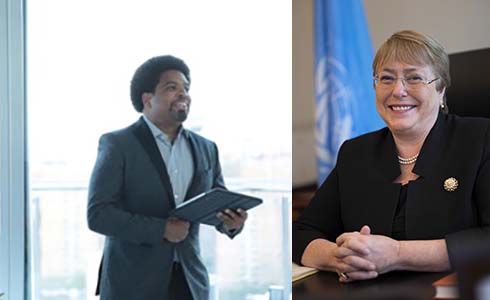
The New School’s Institute on Race, Power and Political Economy and the United Nations Human Rights Office Partner to Promote a Justice-Based Global Economy
The Institute on Race, Power and Political Economy (IRPPE) at The New School was founded in 2021 to advance research on structural inequality and identify groundbreaking
ways to promote equity. the IRPPE examines the intersections of race, power, social stratification, and political economy, with the aim of promoting economic and racial justice. In a short time, the IRPPE has established itself as a prominent research center in this area. Now it is partnering with the United Nations Office of the High Commissioner for Human Rights (OHCHR) to develop the conceptual foundations for a human rights–based economy.
The Partnership for a Human Rights Economy combines the efforts of the two organizations to further analysis and economic policymaking designed to promote human rights for all and end discrimination. In addition to advancing the IRPPE’s work in this area, the partnership ties in with the OHCHR’s Surge Initiative, established by UN High Commissioner for Human Rights Michelle Bachelet in response to rising inequality and social unrest around the world. The Surge Initiative works to increase international engagement in defending economic, social, and cultural rights and to strengthen the link between human rights and economics.
The new partnership is seeded in a common conviction that economic, social, and cultural rights, including the rights to health, education, social security, and decent work conditions, are key elements of an inclusive economic model. “Our history of disenfranchisement is well documented, both across and within nation-states. Countries across the Global South, and descendants from Africa and Indigenous peoples across the world have long been exploited and excluded from full economic participation. A human rights economy presents a potent structural and policy apparatus to combat that,” said Darrick Hamilton, founder and director of the IRPPE, in a press release.
“Human rights are guardrails to help us … dismantle structural drivers of exclusion and inequality and prevent instability and conflict. This collaboration can help inform economic solutions that depart from traditional approaches and add conceptual clarity for economies that place human rights and equality at their center,” said Bachelet in a press release. She welcomes the partnership, “which comes at a time when the lives and livelihoods of many people and the health of the planet are at serious risk due to the existence of concurrent crises. The current moment challenges us to forge new and more groundbreaking steps to ensure the protection of economic, social and cultural rights, including by questioning some of our accepted economic concepts and policies,” she said.
The partnership will work across countries and with various stakeholders such as economists, governments, academics, advocacy groups, and international financial institutions to develop the conceptual foundations of a human rights–promoting economy.
The multiple pressing issues confronting the world today—the COVID-19 pandemic, inflation, growing food insecurity in developing countries resulting from the war in Ukraine—have magnified the need for a human rights–based approach to create transformative, inclusive economies.
“Right now, growing numbers of people are having to skip meals,” said Savitri Bisnath, senior economist for UN Human Rights’ Surge Initiative. “Their salaries are not going up, while inflation is going up. They can’t afford to take public transportation to go from their home to the hospital or to access healthcare.” Bisnath adds that the partnership will look at the responsibility of States under international human rights law. “Because of the Universal Declaration of Human Rights, because of the International Covenant on Economic, Social, Cultural Rights, among others, governments are bound to anchor budgeting and other aspects of economic policy to human rights obligations. The focus is on leaving no one behind,” she said.
Grieve Chelwa, director of Research at the IRPPE, connects the importance of the partnership’s work to the Universal Declaration of Human Rights (UDHR), as it is aimed at protecting the dignity of human beings. “Economic rights were and are recognized as rights in the UDHR, historically recognized as an important aspect of dignity,” Chelwa said. “But that has been marginalized. As an economist, you can’t have a discussion of dignity without thinking about economic rights. It’s crucial for everyone to have the resources necessary to enable them to live self-determined lives, lives of agency.”
“Our economies have been grounded in a limited and skewed notion of rights—not the economic rights of people, but the economic rights of property. This conception of rights is devoid of an honest reckoning of the violence and the immoral practices by which that property came to be distributed in the first place. It’s time we anchored the idea of inclusive economic and social rights as the very basis of a moral and human rights economy. Fundamental is acknowledging the ways in which race, ancestral origins, gender, and other social identities have long been weaponized to serve the interests of those with power—all at the expense of the many, and of democracy itself,” Hamilton said.